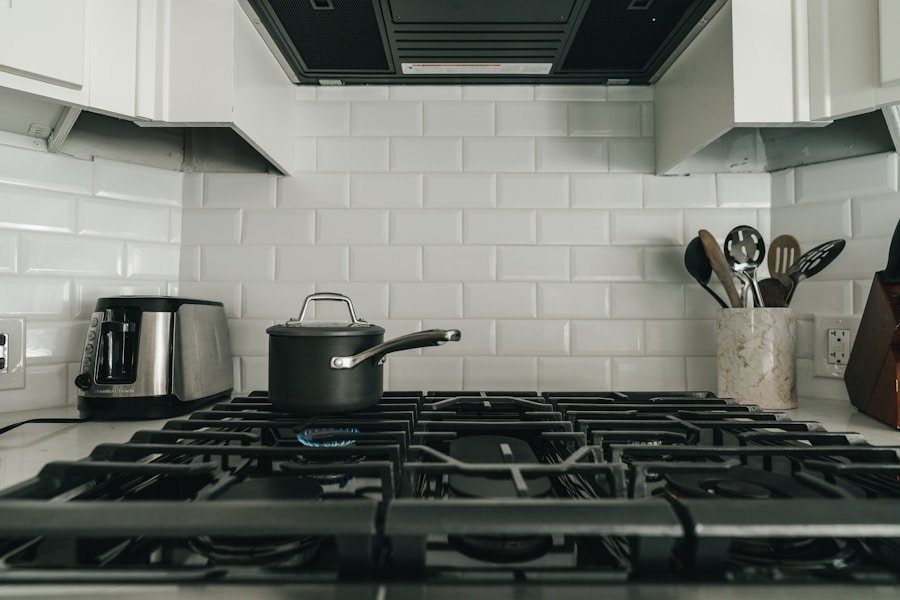When it comes to outdoor cooking, selecting the right camping stove is crucial. A key consideration is the type of fuel to use: gas or propane. Gas camping stoves operate on white gas or unleaded gasoline, whereas propane stoves utilize propane as their fuel source.
It is essential to understand the advantages and disadvantages of each option to make an informed decision. Gas camping stoves are renowned for their reliability and cold-weather performance. They also offer long-term cost-effectiveness, as white gas is generally cheaper than propane.
On the other hand, propane stoves are highly convenient, featuring easy setup and use. Additionally, propane is widely available at most outdoor stores, making it a popular choice among campers. By understanding these differences, individuals can make an informed decision when selecting the best camping stove for their outdoor adventures.
Key Takeaways
- Gas stoves are more fuel-efficient than propane stoves, making them a better choice for longer outdoor adventures.
- Propane stoves offer more convenience with easy setup and no need for priming, but they can be bulkier to carry.
- Safety tips for using both gas and propane stoves include proper ventilation, stable placement, and keeping flammable materials away.
- Gas stoves provide better cooking performance with consistent heat output, while propane stoves may struggle in colder temperatures.
- Propane stoves have a lower environmental impact as they produce fewer emissions and are often refillable, making them a more eco-friendly choice.
Gas Stoves: Efficient in Cold Weather
Gas stoves are known for their ability to burn hot and efficiently in cold weather, making them a great option for winter camping trips. They also tend to be more fuel-efficient than propane stoves, meaning you’ll need to carry less fuel with you on your outdoor adventures.
Propane Stoves: Convenient and Easy to Use
On the other hand, propane stoves are incredibly convenient and easy to use, making them a popular choice for many campers. Propane is also readily available at most outdoor stores, making it easy to refuel your stove while on the go.
Choosing the Right Stove for Your Needs
In terms of fuel efficiency, it’s important to consider the type of outdoor activities you’ll be engaging in. If you’re planning on camping in cold weather or at high altitudes, a gas stove may be the best option for you. However, if convenience and ease of use are your top priorities, a propane stove may be the better choice. Ultimately, the best camping stove for your outdoor adventures will depend on your specific needs and preferences.
The Convenience Factor: Pros and Cons of Gas and Propane Camping Stoves
When it comes to convenience, propane camping stoves have a clear advantage over gas stoves. Propane is incredibly easy to set up and use, making it a popular choice for many campers. Propane canisters are readily available at most outdoor stores, and the stoves themselves are typically easy to light and adjust.
On the other hand, gas stoves can be a bit more finicky to set up and use, as they require priming and pumping before they can be lit. However, gas stoves are known for their reliability and ability to perform well in cold weather, making them a great option for winter camping trips. In terms of convenience, it’s important to consider your own level of experience and comfort with outdoor cooking equipment.
If you’re new to camping or prefer a hassle-free cooking experience, a propane stove may be the best option for you. However, if you’re an experienced camper who values reliability and performance, a gas stove may be the better choice. Ultimately, the convenience factor will depend on your own preferences and priorities when it comes to outdoor cooking.
Safety Considerations: Tips for Using Gas and Propane Stoves in the Great Outdoors
When it comes to using camping stoves in the great outdoors, safety should always be a top priority. Both gas and propane stoves come with their own set of safety considerations that campers should be aware of. Gas stoves require priming and pumping before they can be lit, which can be a bit more involved than simply turning on a propane stove.
However, once properly primed and lit, gas stoves are known for their reliability and ability to perform well in cold weather. On the other hand, propane stoves are incredibly convenient and easy to use, but campers should be mindful of the potential hazards associated with propane fuel. To ensure safe and enjoyable outdoor cooking experiences, campers should always follow the manufacturer’s instructions when using camping stoves.
It’s also important to set up your stove on a stable surface away from flammable materials and never leave it unattended while in use. Additionally, campers should always carry a fire extinguisher or water source in case of emergencies. By following these safety tips and being mindful of the potential hazards associated with camping stoves, campers can enjoy their outdoor cooking experiences with peace of mind.
Cooking Performance: How Gas and Propane Stoves Stack Up for Outdoor Cooking
| Feature | Gas Stove | Propane Stove |
|---|---|---|
| Portability | Lightweight and easy to transport | Heavier and less portable due to the propane tank |
| Heat Output | Lower heat output, suitable for simmering | Higher heat output, better for boiling and quick cooking |
| Temperature Control | More precise temperature control | Less precise temperature control |
| Cost | Lower initial cost, but higher fuel cost | Higher initial cost, but lower fuel cost |
| Environmental Impact | Produces more greenhouse gases | Produces less greenhouse gases |
When it comes to cooking performance, both gas and propane stoves have their own strengths. Gas stoves are known for their ability to burn hot and efficiently in cold weather, making them a great option for winter camping trips. They also tend to be more fuel-efficient than propane stoves, meaning you’ll need to carry less fuel with you on your outdoor adventures.
On the other hand, propane stoves are incredibly convenient and easy to use, making them a popular choice for many campers. Propane is also readily available at most outdoor stores, making it easy to refuel your stove while on the go. In terms of cooking performance, it’s important to consider the type of outdoor activities you’ll be engaging in.
If you’re planning on cooking in cold weather or at high altitudes, a gas stove may be the best option for you. However, if convenience and ease of use are your top priorities, a propane stove may be the better choice. Ultimately, the best camping stove for your outdoor adventures will depend on your specific needs and preferences.
Environmental Impact: Exploring the Eco-Friendly Aspects of Gas and Propane Camping Stoves
Gas Stoves: Reliability vs. Environmental Concerns
Gas stoves typically use white gas or unleaded gasoline as fuel, which can have a negative impact on the environment if not properly disposed of. However, gas stoves are known for their reliability and ability to perform well in cold weather, making them a great option for winter camping trips.
Propane Stoves: A Cleaner-Burning Alternative
On the other hand, propane is considered a cleaner-burning fuel than gasoline, making it a more environmentally friendly option for outdoor cooking. In terms of environmental impact, it’s important to consider the long-term effects of using different types of fuel for camping stoves.
Environmental Impact: A Key Consideration for Campers
While gas stoves may be more cost-effective in the short term, they can have a negative impact on the environment if not properly managed. Propane stoves, on the other hand, are considered a cleaner-burning fuel and may be a better option for campers who are mindful of their environmental impact. Ultimately, the environmental impact of camping stoves is an important consideration for those who enjoy spending time in the great outdoors.
Making the Right Choice: Factors to Consider When Choosing Between Gas and Propane Camping Stoves
When it comes to choosing between gas and propane camping stoves, there are several factors that campers should consider. The first factor to consider is your specific outdoor activities and needs. If you’re planning on camping in cold weather or at high altitudes, a gas stove may be the best option for you due to its ability to perform well in these conditions.
On the other hand, if convenience and ease of use are your top priorities, a propane stove may be the better choice. Another factor to consider is your level of experience and comfort with outdoor cooking equipment. If you’re new to camping or prefer a hassle-free cooking experience, a propane stove may be the best option for you.
However, if you’re an experienced camper who values reliability and performance, a gas stove may be the better choice. Ultimately, the right choice between gas and propane camping stoves will depend on your specific needs and preferences when it comes to outdoor cooking. In conclusion, choosing between gas and propane camping stoves is an important decision that can have a significant impact on your outdoor cooking experiences.
By understanding the differences between these two types of stoves and considering factors such as fuel efficiency, convenience, safety, cooking performance, environmental impact, and personal preferences, campers can make informed decisions that will enhance their enjoyment of the great outdoors. Whether you prefer the reliability of a gas stove or the convenience of a propane stove, there is a camping stove out there that is perfect for your outdoor adventures.
FAQs
What are the main differences between gas and propane camping stoves?
Gas camping stoves typically use butane or a butane-propane mix, while propane camping stoves use propane as the fuel source. Gas stoves are generally more compact and lighter, while propane stoves tend to be more powerful and better suited for larger groups.
Which type of camping stove is more efficient?
Propane camping stoves are generally more efficient than gas stoves, as propane has a higher energy content and performs better in colder temperatures.
Are there any safety considerations when using gas or propane camping stoves?
Both gas and propane camping stoves should be used in well-ventilated areas to prevent carbon monoxide buildup. It’s important to follow the manufacturer’s instructions for safe use and storage of camping stoves.
Can gas and propane camping stoves be used in all weather conditions?
Propane camping stoves are more reliable in cold weather, as they perform better in low temperatures compared to gas stoves. However, both types of stoves can be used in various weather conditions with proper precautions.
Which type of camping stove is more convenient for backpacking?
Gas camping stoves are generally more convenient for backpacking due to their compact size and lighter weight. They are also easier to transport and set up in outdoor environments.













